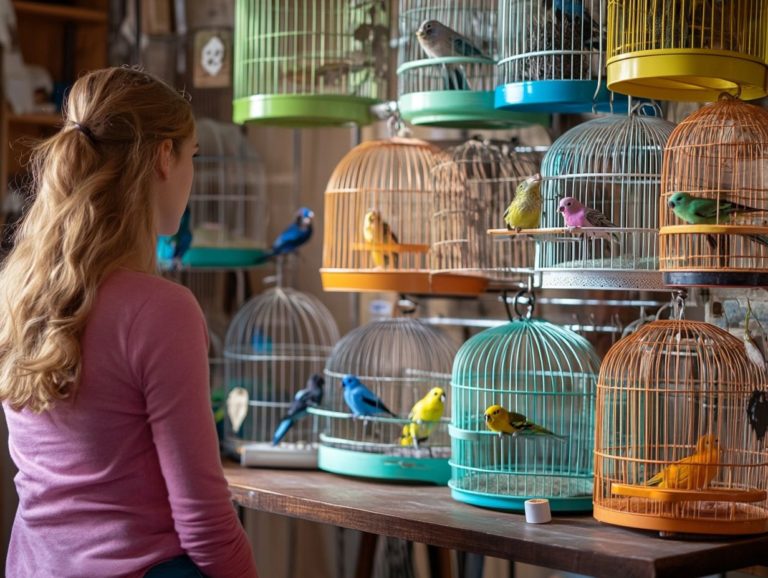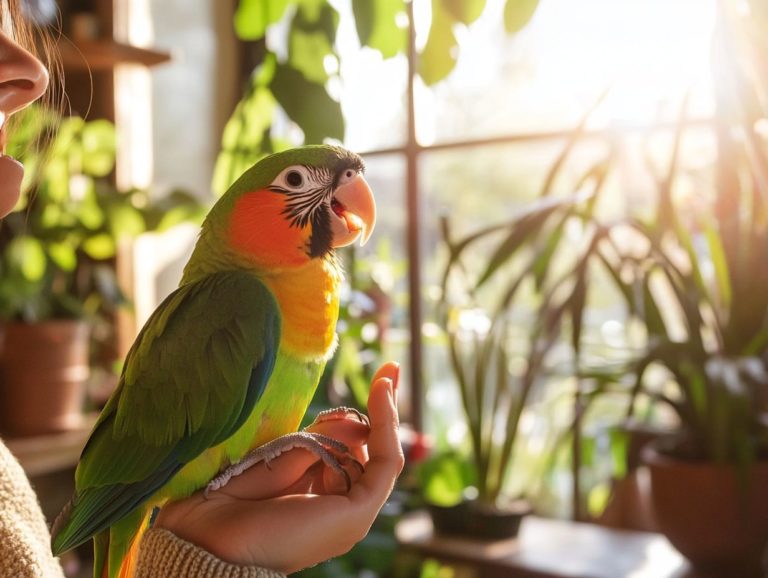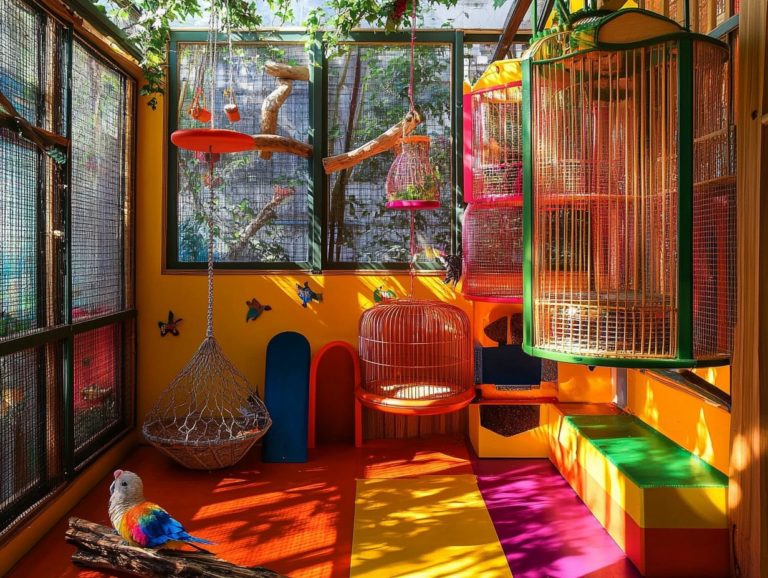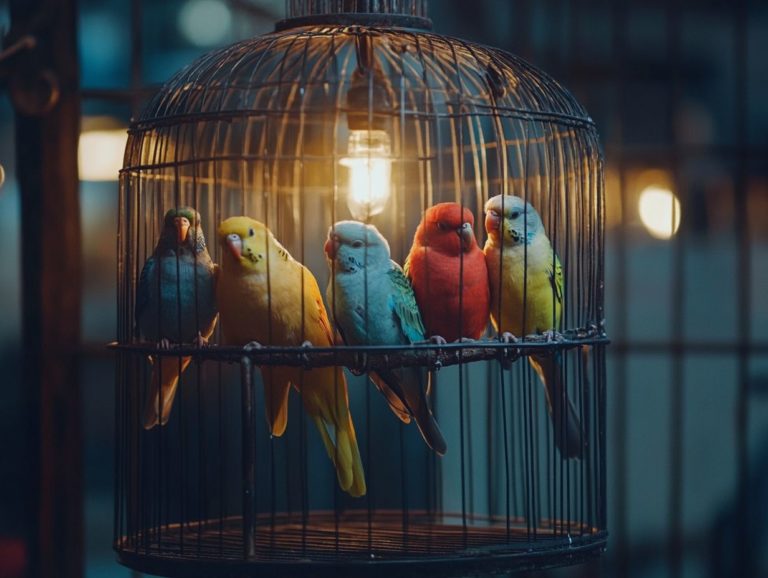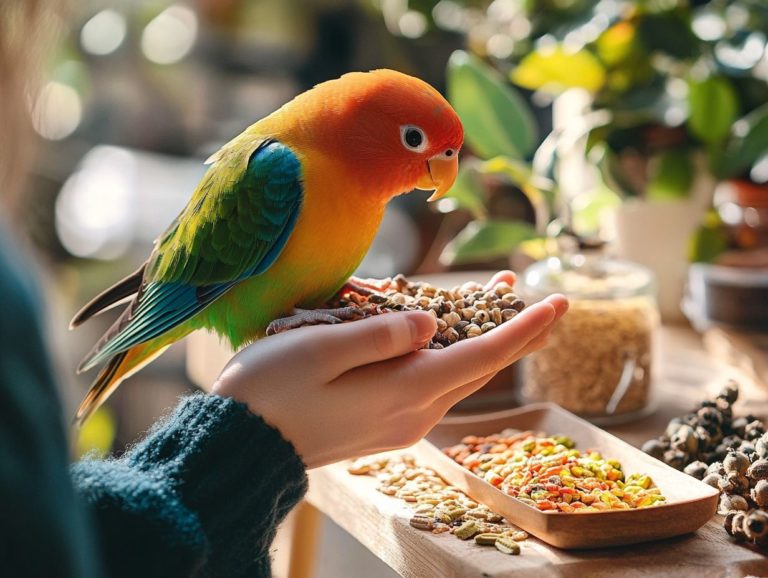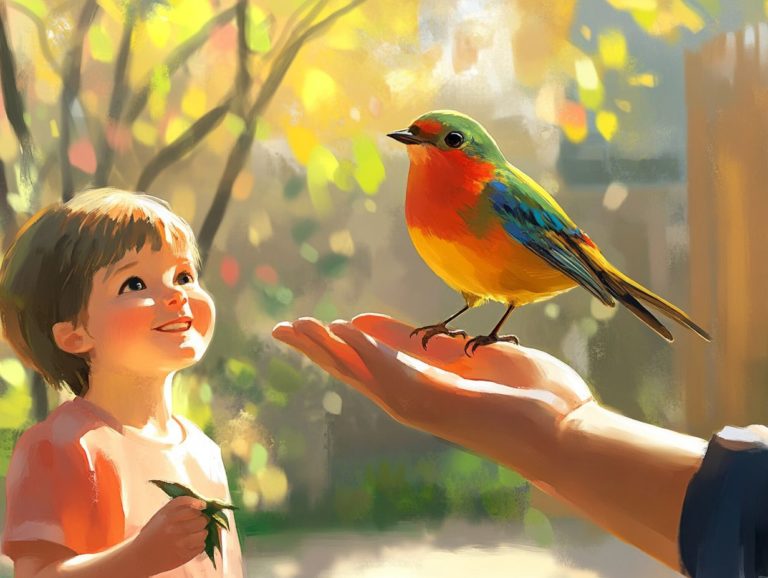How to Tell if My Bird Is Happy?
Understanding your bird’s behavior is crucial for ensuring its happiness and overall well-being. This guide explains normal bird behavior, helping you identify signs of distress or unhappiness.
It explores the environmental factors, such as housing and stimulation, that profoundly influence your bird’s mood. By recognizing the signs your bird is happy both physical and behavioral you can create a nurturing atmosphere that promotes thriving.
Uncover effective strategies to enhance your bird’s happiness and deepen the bond you share.
Contents
Key Takeaways:
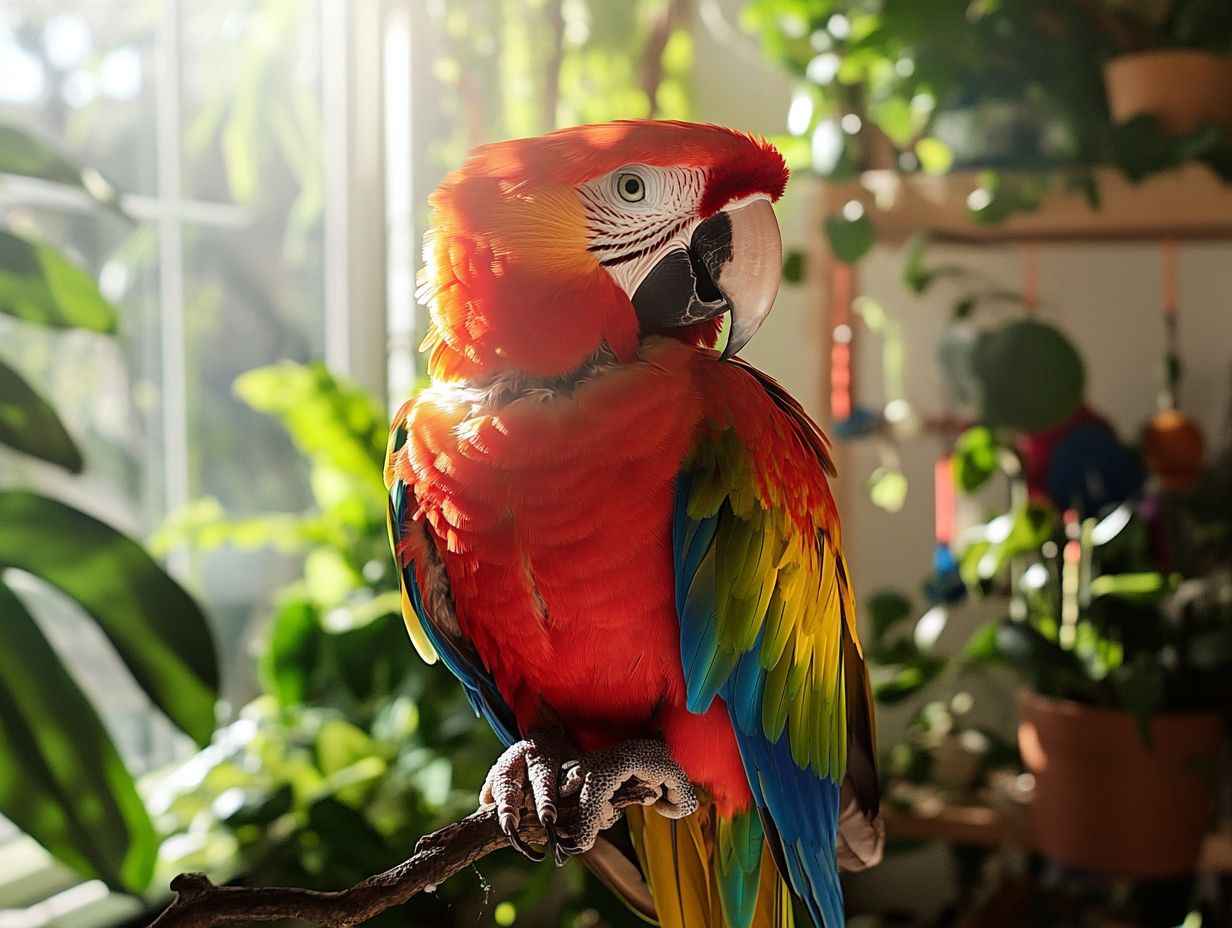
- Observe your bird’s behavior for signs of happiness or distress.
- Ensure your bird’s living environment is suitable and stimulating.
- Look for physical and behavioral cues to determine your bird’s happiness level.
Understanding Bird Behavior
Understanding bird behavior is essential for you as a pet bird owner. It paves the way for a profound bond between you and your feathered companion.
By recognizing the signs of trust, distress, and happiness, you can cultivate an environment where your avian friend truly thrives. Paying attention to their vocalizations and physical interactions offers invaluable insights into their emotions and needs.
This awareness allows you to grasp the intricacies of the bonding process that flourishes through your shared quality time.
Normal Bird Behavior
Normal bird behavior encompasses a delightful spectrum of activities that reflect the health and happiness of your pet birds. You ll find them engaging in playful antics and social interactions with you, their beloved human.
These moments often come alive through a charming array of vocalizations like chirps and whistles, signaling their contentment and eagerness to engage. Watch for telltale body language cues, such as puffing up their feathers or tilting their heads these gestures communicate ease and curiosity.
Grooming is a vital part of their routine. As they meticulously preen their feathers, it showcases their commitment to cleanliness and indicates a relaxed state.
When your bird socializes with other birds or interacts with you, it highlights their inherently social nature. Whether through playful exchanges or mimicking sounds, these behaviors reinforce their emotional well-being and deep-seated need for connection.
Signs of Distress or Unhappiness
Watch for your bird’s signals! Signs of distress or unhappiness can be found in their behaviors, such as excessive vocalizations, feather plucking, or, in more extreme cases, regurgitating food.
You may observe changes in their eating habits, like a refusal to eat or a sudden preference for certain foods, which can indicate underlying health issues. Their physical appearance is also a vital indicator; a bird that looks ruffled, has dull feathers, or assumes an unusual posture might be struggling.
Act now to create a healthy environment! Ensure proper nutrition, social interaction, and mental stimulation these elements play a significant role in avian health and well-being. By providing enriched living conditions, you can help mitigate these distress signals, fostering happier and healthier birds.
Environmental Factors Affecting Bird Happiness
The environment is crucial to the happiness of your pet birds. Factors like housing setup, stimulation, and enrichment significantly influence their well-being and behavior.
By creating an optimal environment, you ensure your feathered friends thrive and flourish.
Housing and Cage Setup
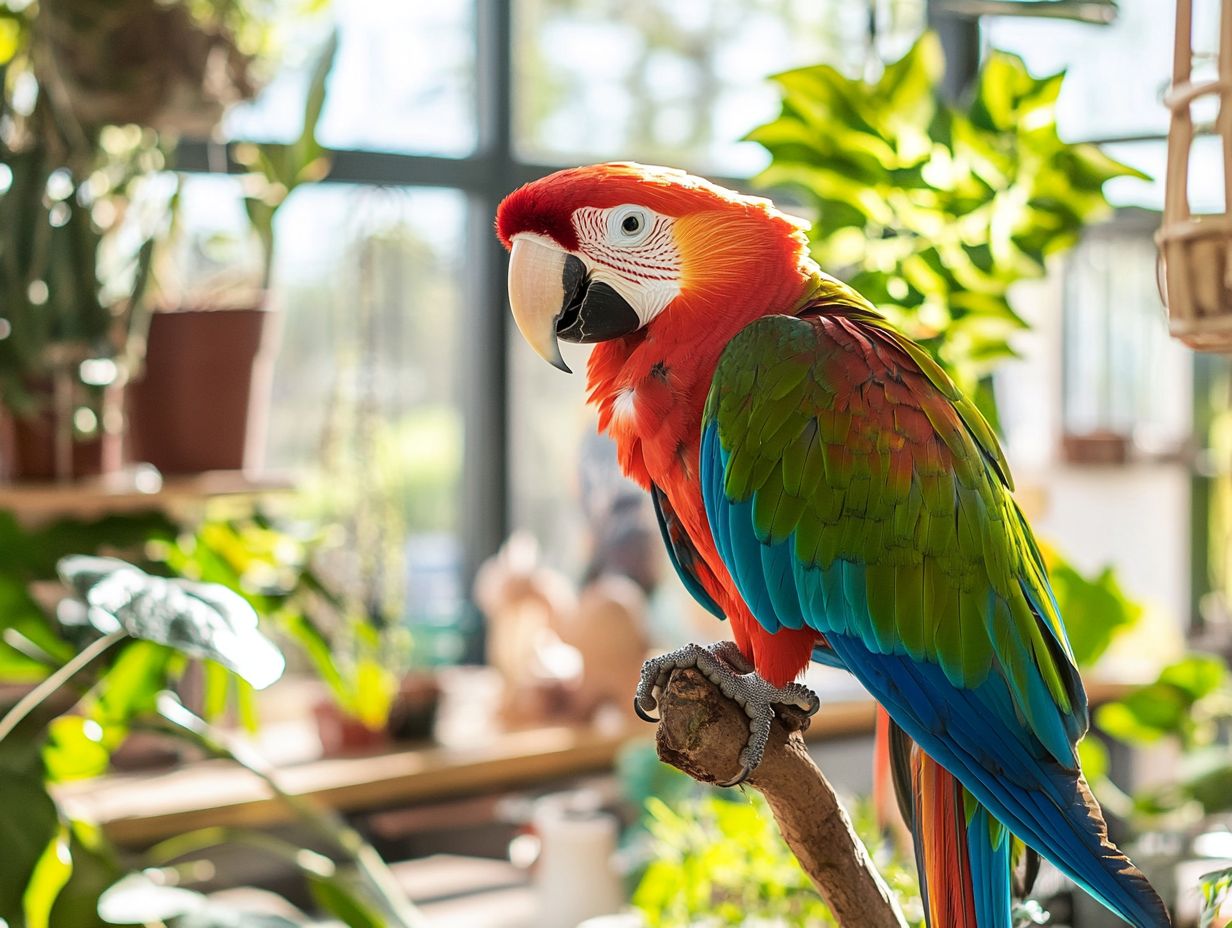
A well-designed housing and cage setup is crucial for your pet birds’ comfort and happiness. It provides them with ample space to move and engage with their surroundings.
Choose a cage that is spacious enough for them to stretch their wings. Place it in a spot that receives natural light. Incorporate various perches at different heights and an assortment of engaging toys that encourage play and mental stimulation.
By providing multiple food and water dishes, you ensure that your birds can easily access their necessities. Prioritizing these elements helps create a nurturing environment that promotes their physical well-being and emotional health.
Stimulation and Enrichment
Stimulation and enrichment are key for your pet birds’ mental and physical well-being. They help birds act naturally and encourage positive body language.
Offer a variety of enrichment options to significantly enhance their quality of life! For example, introduce toys that promote problem-solving to ignite their curiosity and boost their thinking skills. Social interactions with you or other birds enrich their emotional health, resulting in happier and more confident companions.
Incorporate regular training activities, like teaching new tricks. This not only strengthens your bond but also gives them a mental workout. Engage in physical interactions through playtime or gentle grooming to reinforce trust and affection!
Signs of a Happy Bird
Recognizing the signs of a happy bird is essential for you as a bird owner. It reassures you that you are fostering a loving and healthy environment for your feathered friends.
Physical Indicators
Physical indicators are essential in evaluating a bird’s happiness. A relaxed demeanor and positive body language are clear signs that your avian companion is content. For more insights, check out the signs your finch is happy and healthy.
For instance, feathers fluffed up usually suggest that your bird feels comfortable and secure. Calm vocalizations, such as soft chirps or gentle whistles, signal a positive and relaxed state, unlike alarming squawks that indicate distress.
An active bird glides purposefully around its space, engaging in playful behaviors like preening or exploring. These actions reveal a joyful spirit! By paying attention to these cues, you can better assess your bird s emotional well-being.
Behavioral Cues
Behavioral cues help you understand your bird’s emotional landscape. Specific actions serve as indicators of happiness that enhance your bond.
As you observe these charming creatures, you might hear joyful vocalizations, from cheerful chirps to melodious songs. Playful antics, like excitedly flapping their wings or swinging on their perches, showcase their vibrant spirits.
Your bird often craves physical interaction whether it’s snuggling close to you or preening you. Recognizing these behaviors enriches your connection and cultivates an environment where both of you feel comfortable and secure!
Ways to Increase Bird Happiness
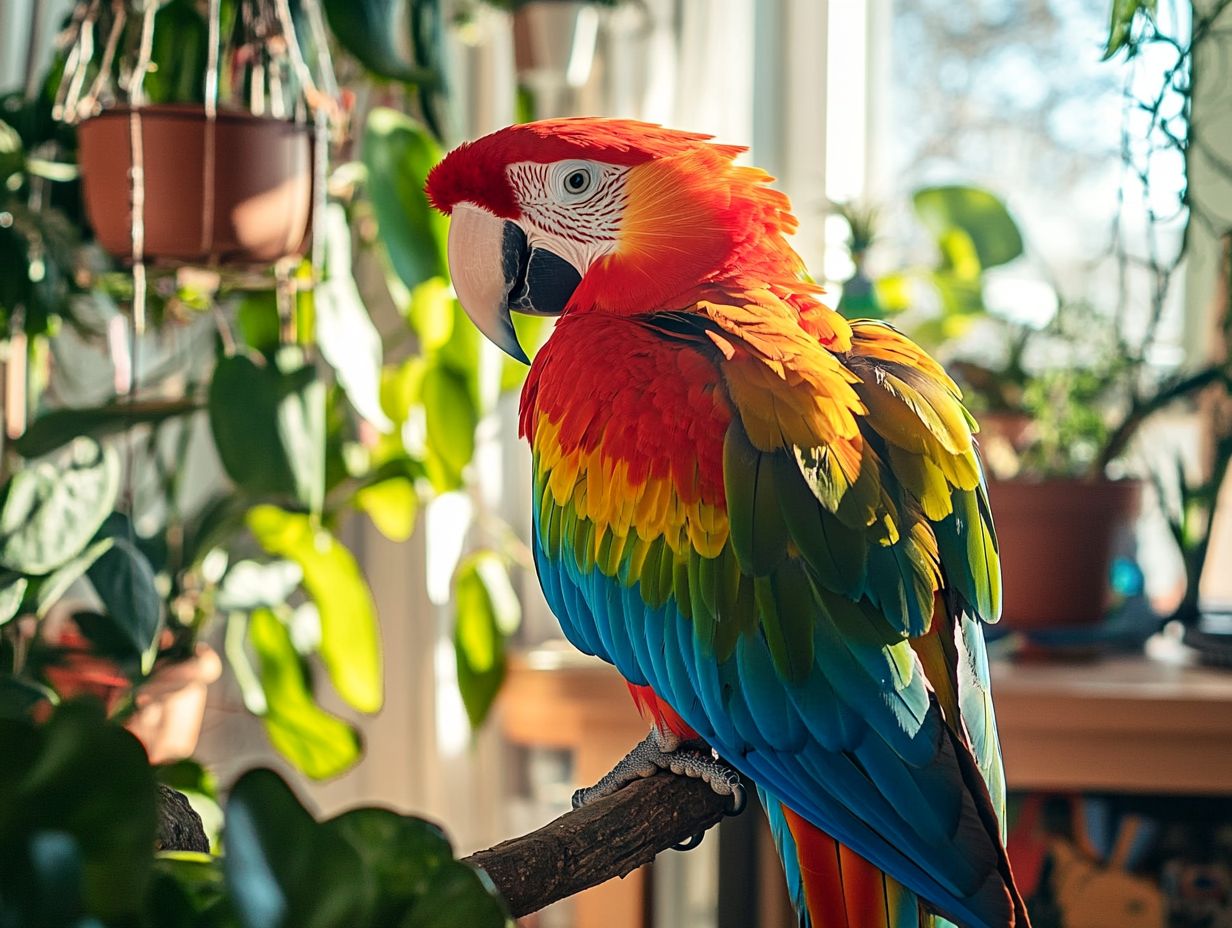
Enhancing your birds’ happiness is rewarding! Cultivate a nurturing environment and engage in activities that deepen your bond with them.
Start observing your bird today to discover what makes it happy!
Creating a Positive Environment
Creating a positive environment for your pet birds means ensuring their surroundings are safe, stimulating, and supportive of their overall health. This fosters trust and security.
Your bird s habitat should feature a spacious and well-ventilated cage. This allows for natural movement and exploration.
Regularly cleaning their space keeps diseases at bay and shows your commitment to their health and happiness.
Incorporate interactive toys toys that keep your bird busy and happy. This enhances their mental stimulation and encourages social behavior and physical activity.
Look for signs of trust, like your bird s willingness to approach or mimic sounds. This helps you understand their needs better.
By cultivating such an atmosphere, you re ensuring their happiness and strengthening your bond.
Building a Bond with Your Bird
Building a bond with your bird is an exciting adventure! It requires patience, quality time, and understanding of their unique needs and behaviors.
Start with daily interactions that promote trust and comfort. This allows your bird to feel secure in its environment.
Engaging in training sessions stimulates their minds and establishes a line of communication between you two. This fosters a deeper connection.
Socialization is crucial. Expose your bird to various experiences to reduce fear and build confidence.
Through consistent positive experiences, you can strengthen your bond, cultivating a fulfilling relationship grounded in mutual respect and love.
Frequently Asked Questions
How to Tell if My Bird Is Happy?
You can tell if your bird is happy by observing its body language and behavior. For instance, signs of contentment include a relaxed posture, singing, or social interaction. To learn more, check out the signs of a happy pet bird.
What are some signs of an unhappy bird?
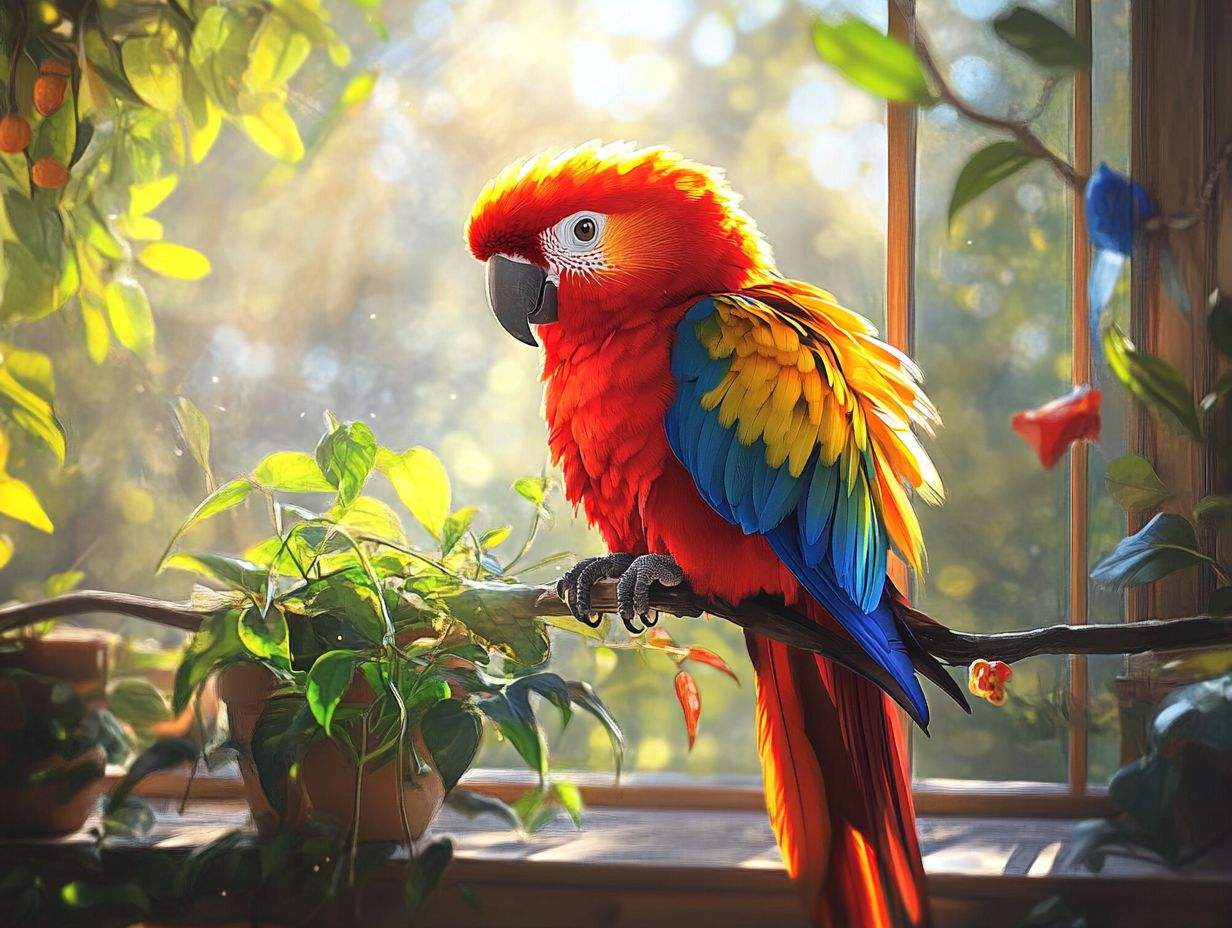
Signs of an unhappy bird include feather plucking, lack of interest in toys, aggression, and decreased appetite.
Can a bird’s diet affect its happiness?
Yes, a bird’s diet greatly impacts its overall health and happiness. Ensure your bird gets a balanced and nutritious diet.
Do birds need companions to be happy?
While some birds can be content alone, most thrive with company. Consider getting a companion if you notice signs of loneliness.
How can I create a happy environment for my bird?
Provide a spacious and stimulating environment. Ensure plenty of toys, perches, and space to fly and explore.
Be sure to include mental stimulation through training and interactive playtime.
What should I do if I suspect my bird is unhappy?
Address any signs of unhappiness promptly. Consult a veterinarian to rule out health issues and ensure your bird’s basic needs are met.
Enriching your bird’s environment and spending quality time can also help improve its happiness.

